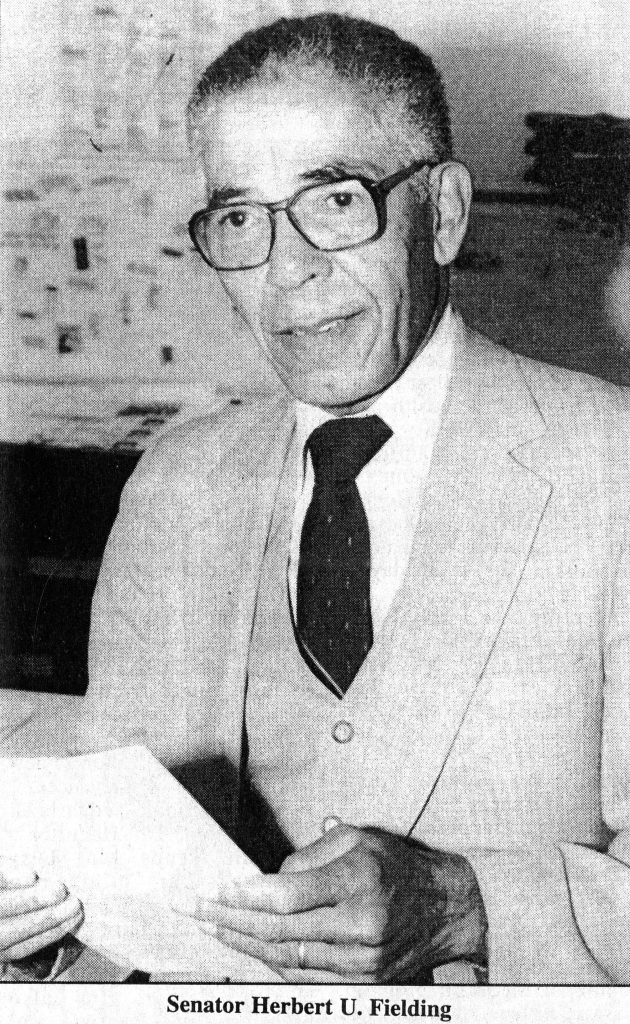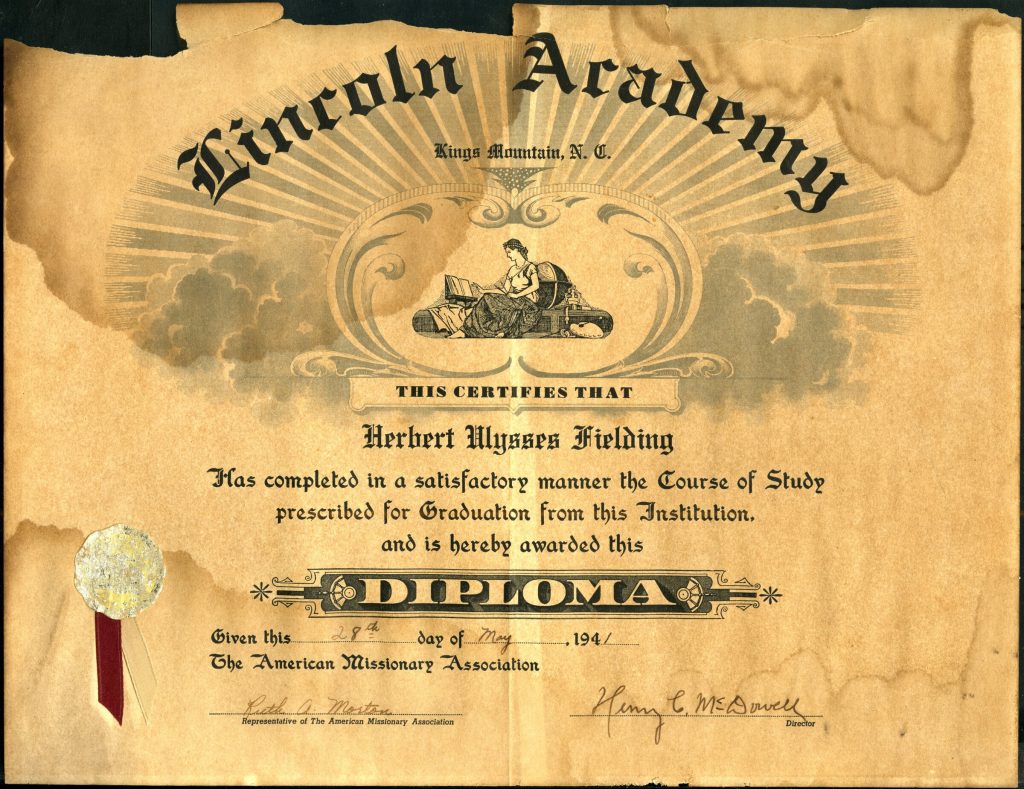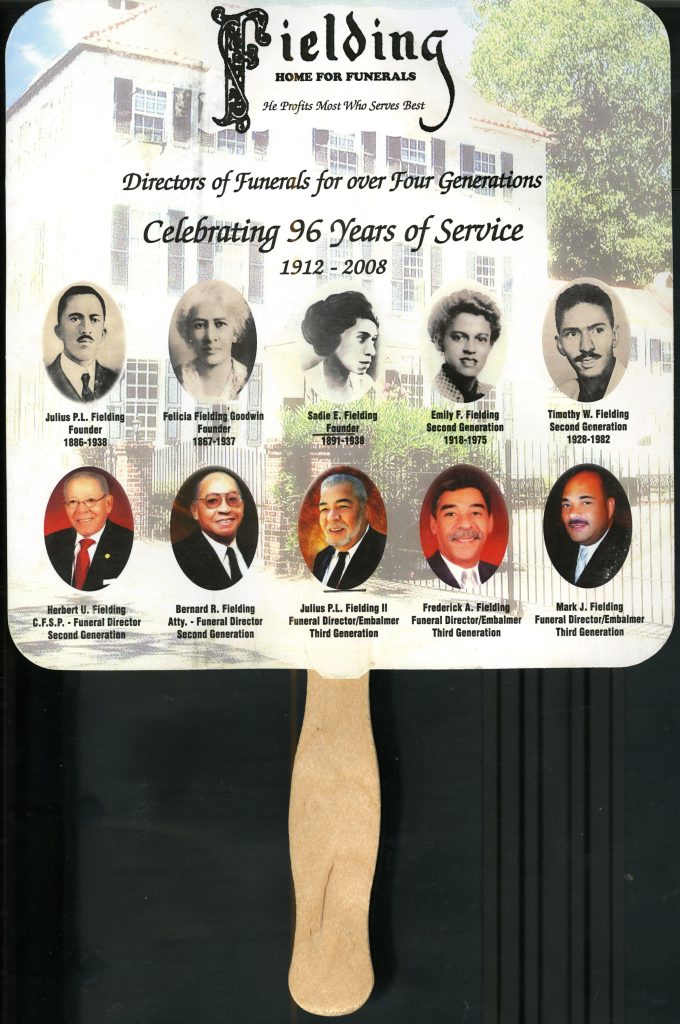» Expanding the Scope of Sen. Herbert U. Fielding’s Legacy
This post is written by Nate Hubler, the Avery Research Center’s Liberatory Legacies Archival Fellow, who started in this position in February 2024. She will contribute blog posts about the collections she is processing through the grant.

Herbert Ulysses Fielding was a prominent figure in the Lowcountry with a long and varied career spanning organizing, politics, and mortuary work. While his work took many forms throughout his life, he always centered his endeavors on his community and deep respect for those around him.
I recently processed an accrual to the collection of Herbert U. Fielding’s papers at the Avery Research Center, which further cements this legacy and helps expand our understanding of his life and work. This work was funded by the Andrew W. Mellon Foundation’s grant that Avery received. I want to take this opportunity to share Sen. Fielding’s accomplished life and highlight a few selections from the accrual along the way.
Born in Charleston in 1923, Herbert began his education at the Avery Normal Institute, where he attended junior high, or what is more commonly referred to as middle school today. Upon completing Avery’s junior high program, Herbert traveled to King’s Mountain, North Carolina, to complete his high school education at Lincoln Academy, another school run by the American Missionary Association.

After earning his high school diploma in 1941, he enlisted in the United States Army, where he served as a company clerk and participated in the D-Day invasion of Normandy. Over sixty years later, Herbert revisited the beaches of Normandy with Elmore Browne, a fellow Averyite who also participated in the invasion.
He was honorably discharged from the Army in 1946 and then attended West Virginia State College to earn a Bachelor of Science in Business Administration. A degree that would prove useful for his entire life as he was often working at Fielding Home for Funerals, his family’s funeral home founded in 1912.
Herbert was an active member of the Civil Rights movement in Charleston and often helped raise bail for community members arrested during anti-segregation demonstrations. He also founded the Political Action Committee of Charleston County (PAC), which focused its efforts on providing voter education to the community and promoting the employment of African Americans on voter registration boards and school trustee boards.

It seems natural that his work with the PAC eventually led to Herbert running for a seat in the South Carolina House of Representatives in 1970. He won his race and became one of the first African Americans to hold office in the South Carolina Legislature since the end of Reconstruction.
He won his re-election for his seat in 1972. Still, despite significant support from his colleagues, he resigned in December 1973 after being found guilty of willfully failing to file his 1967 federal income taxes. Following his resignation, he continued to work at Fielding Home for Funerals and as a lobbyist, with one of his most significant campaigns during this period focused on unionism. Never far from the pulse of Lowcountry politics, he supported numerous campaigns while out of office, including Isaiah E. Bennett’s race for a County Council seat in 1980.
He would again run for a seat in the House of Representatives and be elected in 1982. In 1984, instead of running for re-election in his current House seat, he campaigned for District 42’s seat in the South Carolina Senate and won his race. He would then win his re-election campaign in 1988. While a Senator, he was an active member of the South Carolina Legislative Black Caucus and served as Chairman of the Caucus from 1990-1992.
While a Senator, he fought for adequate funding for community programs in the Lowcountry, worked to outlaw marital rape, address overcrowding of South Carolina’s jails and prisons as well as the differing conditions of school buildings in the Charleston County School District, and reapportion South Carolina to create an African American majority district, District 6. The reapportionment was a significant focus in his final few years in the Senate. Many of the census maps he used to visualize and weigh different district configurations are now included in the collection.
After weighing his options for months, he eventually ran for the newly created district’s Senate seat in 1992. However, he lost the primary to James Clyburn and retired from the State Senate later that year.
His retirement would not mean the end of his focus on serving his community. He would continue to work as a Funeral Director at Fielding Home for Funerals and stay involved in politics as a lobbyist, delegate to two Democratic National Conventions, and member of the Charleston Democratic Breakfast Club and Trident Urban League.
He also served as an advisor on the boards of the School of the Building Arts and the Joseph P. Riley, Jr. Institute for Urban Affairs and Policy Studies. He maintained his lifelong involvement in the Omega Psi Phi Fraternity, National Funeral Directors Association, South Carolina Morticians Association, and Calvary Episcopal Church. He even drafted a book proposal, Black Life in South Carolina: 1939-2010, with James L. Felder.


His life and career were celebrated on multiple occasions. First, in 1996, through the dedication of Highway 61 from the James Island Expressway to South Carolina Route 61 as the Sen. Herbert U. Fielding Connector. He was also inducted into the South Carolina Black Hall of Fame in 2005. Additionally, he celebrated numerous anniversary milestones with his family at the Fielding Home for Funerals as they approached and passed their centennial anniversary.
The Herbert U. Fielding papers are open to the public for research and contain a wide variety of material documenting Sen. Fielding’s life. We encourage everyone to peruse the finding aid and schedule an appointment to visit!
Image Credits
Herbert U. Fielding portrait, Herbert U. Fielding papers, Box 27, Folder 3, Avery Research Center for African American History and Culture, College of Charleston, Charleston, SC, USA.
Lincoln Academy diploma, Herbert U. Fielding papers, Oversize Box 5, Folder 19, Avery Research Center for African American History and Culture, College of Charleston, Charleston, SC, USA.
Democratic Action Team pamphlet, Herbert U. Fielding papers, Box 12, Folder 16, Avery Research Center for African American History and Culture, College of Charleston, Charleston, SC, USA.
Fielding family photo, Herbert U. Fielding papers, Box 27, Folder 3, Avery Research Center for African American History and Culture, College of Charleston, Charleston, SC, USA.
Fielding Home for Funerals 96th anniversary fan, Herbert U. Fielding papers, Box 11, Folder 4, Avery Research Center for African American History and Culture, College of Charleston, Charleston, SC, USA.
We thank the Andrew W. Mellon Foundation for supporting the processing of this archival collection.
